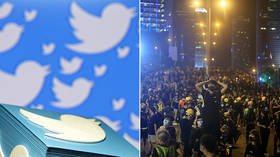‘Sowing discord’ again? Twitter wades into Hong Kong protests with hunt for ‘Chinese bots’

In another high-profile purge, Twitter has announced the deletion of nearly 1,000 accounts from its platform, citing fears that “Chinese bots” are “sowing discord” in Hong Kong after months of heated protests there.
After coming under fire recently for its alleged role in protests in China, Twitter has taken steps to combat what it called a “significant state-backed information operation focused on the situation in Hong Kong,” according to the company’s Monday blog post. In all, the firm said 936 accounts were permanently suspended “for a range of violations” of its policies.
We're disclosing coordinated account activity focused on the ongoing protest movement in Hong Kong. Our investigations have found that these accounts are linked to state-backed information operations from mainland China.https://t.co/Pc9R90Dp85
— Twitter Safety (@TwitterSafety) August 19, 2019
“Based on our intensive investigations, we have reliable evidence to support that this is a coordinated state-backed operation,” the blog post said of the deleted accounts. “Specifically, we identified large clusters of accounts behaving in a coordinated manner to amplify messages related to the Hong Kong protests.”
Using the “sow discord” language directly out of Special Counsel Robert Mueller’s report, the company’s blog post reads much like a rehash of the 2016 presidential election, in which so-called “Russian bots” supposedly played an outsized role.
Also on rt.com The only ‘Russian bots’ to meddle in US elections belonged to Democrat-linked ‘experts’Also reminiscent of 2016’s “Russian bot” craze is Twitter’s connect-the-dots reasoning, in this case identifying a “cluster” of suspicious accounts “behaving in a coordinated manner,” though the company did not elaborate on how such a determination was made. A recent court ruling determined Mueller’s team did not prove any connection between the Russian government and the company that managed the purported “Russian troll farm” – despite making very similar claims of “coordinated behavior.”
READ MORE: Another nail in Russiagate coffin? Federal judge destroys key Mueller report claim
Twitter is certainly no stranger to purges, especially those of the politically motivated variety; in recent months, in fact, the company apparently can’t keep its hands off the banhammer.
April saw British European Parliament candidates Carl Benjamin and Tommy Robinson exiled from the platform, while Russian lawyer Natalia Veselnitskaya was given the boot in June – for no stated reason. The Russian Embassy in Syria briefly fell victim in July, but was soon reinstated, however weeks later three Iranian news agencies would suffer the same fate. Earlier this month, Senate Majority Leader Mitch McConnell and a reporter from the right-of-center Daily Caller were censored on Twitter for reporting the contents of death threats against the senator.
While accounts are removed from Twitter on a daily basis for a variety of reasons, the platform’s major purges are apparently related to political considerations, and the great hunt for ‘Chinese bots’ seems to fall into that category. However, it also amounts to meddling into internal affairs of a major world power.
Also on rt.com Hong Kong in US’ crosshairs? No matter where there’s revolution, we’re there, Ron Paul saysChina has previously warned the US against sticking “their noses in our affairs” in relation to the ongoing Hong Kong protests, with China’s freshly appointed ambassador in Moscow, Zhang Hanhui, reminding that Hong Kong is Chinese and not “American” or “English.”
Hong Kong has been gripped by protests since late March, with demonstrators originally aiming to prevent a bill that would have allowed extradition of criminal suspects to mainland China. While the bill has now been suspended, the protests have grown into a wider movement against China’s rule over the semi-autonomous territory, in which Beijing sees Washington’s hand.
Like this story? Share it with a friend!














